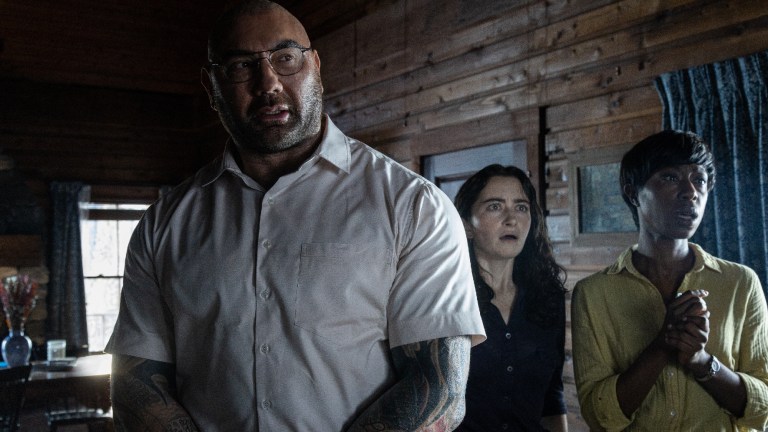Knock at the Cabin Review: Top Shelf M. Night Shyamalan Horror
M. Night Shyamalan adapts an acclaimed apocalyptic horror novel, Knock at the Cabin, with satisfying results.

Following the twin disasters of After Earth and The Last Airbender around a decade ago, M. Night Shyamalan has been on something of a career rebound in the last eight years, with successful films like The Visit and Split, plus the hit Apple TV+ show Servant, to his credit. Shyamalan’s work can be an acquired taste, and even among his fans his output can be hit and miss (like 2021’s divisive Old), but his new film, Knock at the Cabin, is easily his strongest effort since the still-potent Split and may yet end up on the top shelf of his 15 feature films to date.
Based on the novel The Cabin at the End of the World by acclaimed horror writer Paul Tremblay (marking only the third time since The Last Airbender that Shyamalan has adapted previously existing material), Knock at the Cabin offers the kind of semi-Hitchcockian premise and setup that Shyamalan usually relishes. A couple named Eric (Jonathan Groff) and Andrew (Ben Aldridge) are vacationing at a secluded Pennsylvania cabin (meaning no mobile phone reception) with their eight-year-old adopted daughter Wen (Kristen Cui) when the child is approached out front by a massive, hulking stranger named Leonard (Dave Bautista).
The scenario itself is inherently uneasy, despite Leonard’s insistence that he’s not there to hurt Wen or her dads. But any pretense of safety goes out the window as Leonard’s three companions approach from the road, two women and a man, all carrying what appear to be homemade (and frightfully medieval-looking) weapons.
Eventually, we learn what drives Leonard and his companions, which includes Redmond (Rupert Grint, about as far from his Harry Potter days as one can imagine). Initially, Andrew protests the foursome is just there to “kill the queers” (a perception Redmond does not easily dispel). But Leonard insists that they’re not, and calmly explains why he believes this is happening: the four intruders have been warned by a series of visions that the end of the world is imminent, and it can only be averted by the three family members they’ve attacked—Andrew, Eric, and Wen—making an unthinkable choice.
Shyamalan brings the full weight of this grim scenario to bear on his characters in a screenplay (written by him off an earlier draft by Steve Desmond and Michael Sherman) that is largely faithful to Tremblay’s book for about the first two-thirds of the movie. Much of Andrew and Eric’s backstory, which is filled out through their interior thoughts in the book, is visualized through compact flashbacks which slow the narrative slightly but also provide context for their relationship and history.
There is also a significant change to the narrative at a critical juncture, one which takes the story down a somewhat different path than Tremblay’s book but also, in some ways, manages to enhance and bring forward some of the themes that are lurking more subtly in the novel. Anyone who has read the book will know what we’re referring to, and why it would be highly unlikely to make it into a major studio motion picture, but the change arguably makes for a better screen story.
On the surface, Knock at the Cabin is a straightforward, tense thriller with a classic conundrum: have these people truly been cursed with a vision of the apocalypse or are they just out of their minds? In this way, the movie taps into the current and very relevant topic of conspiracy theorists, cults, and blind faith in beliefs that are not supported in facts or reality, which is certainly what we’re seeing with the rise of willfully ignorant entities like QAnon or MAGA election deniers.
Landing his first non-action lead role, Dave Bautista proves here why he is the best actor out of the major wrestlers, including Dwayne Johnson and John Cena, who have crossed over to the screen. Removed from an action or space opera scenario, Bautista brings a stillness and spooky empathy to Leonard, while also embodying the man’s inner torment to an intense degree. Knowing that what he’s doing is wrong, but driven nonetheless to do it, Leonard is a combination of unsettling rationality and emotionality that marks this as perhaps Bautista’s best performance to date.
Equally notable is Ben Aldridge as Andrew, the more practical and hard-headed of the couple who has an explanation for everything—including a possible connection to one of the invaders—and refuses to give up on his efforts to escape the situation despite being pushed to physical and psychological limits. Jonathan Groff provides a softer, more malleable counterpart, and the two men share enough chemistry that watching them slowly get pulled in different directions becomes a little heartbreaking.
Shyamalan finds ways to keep the movie visually interesting, despite most of it taking place on a single set, and stages the action fluently, even if he occasionally pulls off one of his weirdly off-center camera angles. But the claustrophobia of the cabin is effectively portrayed and Shyamalan’s unfolding of the events inside is ably assisted by Herdís Stefánsdóttir’s foreboding score. Although we wish that Knock at the Cabin ratcheted up the inherent tension a little more between what’s real and what isn’t, and some of the filmmaking draws attention to itself, this is strong stuff from a director who, like his stuff or not, has a decidedly singular point of view and vision for his work.
Knock at the Cabin is out in theaters Friday, Feb. 3.
